Iran Likely To Be Ousted From UN Women's Commission

Iran appears set to be ousted from a UN women's body on Wednesday for policies contrary to the rights of women and girls, but several countries are expected to abstain.

Iran appears set to be ousted from a UN women's body on Wednesday for policies contrary to the rights of women and girls, but several countries are expected to abstain.
The United States requested the vote after Mahsa Amini, a 22-year-old woman died in hijab police custody in September with deadly blows to her head. The incident triggered nationwide anti-regime protests during which more young women were killed.
The 54-member UN Economic and Social Council (ECOSOC) will vote on a US-drafted resolution to "remove with immediate effect the Islamic Republic of Iran from the Commission on the Status of Women for the remainder of its 2022-2026 term."
The 45-member Commission on the Status of Women meets annually every March and aims to promote gender equality and the empowerment of women. A US official told Reuters they had "consistently seen growing support" to remove Iran.
Iran, 17 other states and the Palestinians argued in a letter to ECOSOC on Monday that a vote "will undoubtedly create an unwelcome precedent that will ultimately prevent other Member States with different cultures, customs and traditions ... from contributing to the activities of such Commissions."
But Western countries and human rights defenders say Iran’s laws and policies severely discriminate against women and that is a universal rights issue.
Only five of the signatories to the letter are currently ECOSOC members and able to vote on Wednesday.
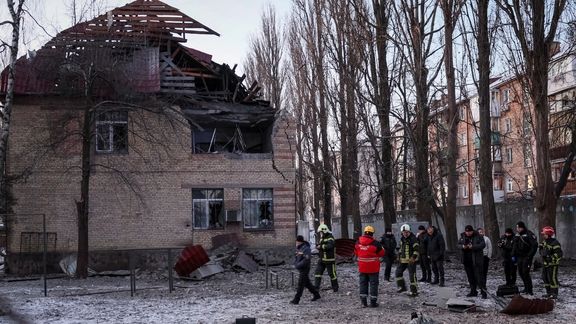
Kyiv's air defense systems shot down 10 Iranian-made drones Wednesday, while the United States is closer to sending its Patriot air defense system to Ukraine.
Kyiv Mayor Vitali Klitschko said that air-defense systems shot down 10 Iranian-made Shahed drones and that there were explosions in the central Shevchenkivskyi district.
The Kyiv administration said that according to preliminary information, two administrative buildings in Shevchenkivskyi were damaged and information about potential casualties was being clarified.
The United States warned about Iran planning to deliver Shahed Kamikaze drones to Russia in July, something Iran has repeatedly denied, only conceding that it gave “some drones” to Russia before the Ukraine war began.
Russia began using the Iranian drones mostly against civilian targets in early October, with hundreds launched so far, but most shot down before reaching their targets.
Washington could announce a decision as soon as Thursday on providing the Patriot, two officials told Reuters on Tuesday. The Patriot is considered one of the most advanced U.S. air defense systems and is usually in short supply, with allies around the world vying for it.
Former Russian President Dmitry Medvedev has warned NATO against equipping Kyiv with Patriot missile defenses, and it is likely the Kremlin will view the move as an escalation.
But there have been Western reports in the past weeks of possible Iranian missile deliveries to Russia as its arsenal is running out due to extensive use against Ukrainian infrastructure targets that are now well defended with multiple systems, but not full proof.
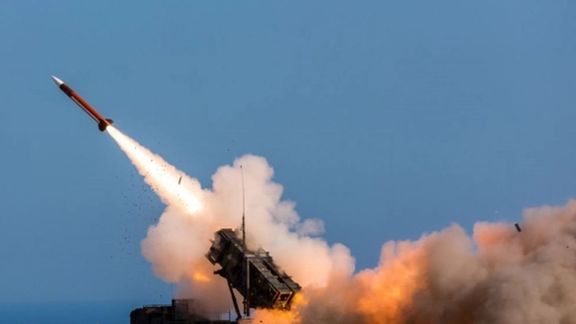
The Patriot system would help Ukraine defend against waves of Russian missile and drone attacks that have pounded the country's energy infrastructure.
The United States and its European allies have also imposed rounds of sanctions against Iranian individuals and entities for their involvement in supplying drones to Russia. The latest instance of such sanctions was announced by the United Kingdom on Tuesday.
Foreign Secretary James Cleverly said UK sanctions were “taking the wheels off the Russian war machine.” A press release referred to “information” released by the US December 9 - apparently a statement by White House Security spokesman John Kirby - showing Iran had become “one of Russia’s top military backers.”
Gaining Patriot air defense capability would be "very, very significant" for the Kyiv government, said Alexander Vindman, a retired Army lieutenant colonel and onetime leader of Ukraine policy at the White House.
"These are going to be quite capable of dealing with a lot of different challenges the Ukrainians have, especially if the Russians bring in short-range ballistic missiles" from Iran.
Kyiv held high-level military talks on Tuesday with Washington, Ukrainian President Volodymyr Zelenskiy's office said. The United States has given Ukraine $19.3 billion in military assistance since Russia's invasion on Feb. 24.
One of the US officials said Ukrainian forces would likely be trained in Germany before the Patriot equipment was delivered. Vindman said the training could take several months.
The Pentagon says Russia's recent surge in missile strikes is partly designed to exhaust Ukraine's supplies of air defenses so it can dominate the skies above the country.
For that reason, the United States and its allies have been delivering more air defenses to Kyiv, everything from Soviet-era systems to more modern, Western ones. Washington has provided NASAMS air defense systems that the Pentagon says have flawlessly intercepted Russian missiles in Ukraine.
With reporting by Reuters
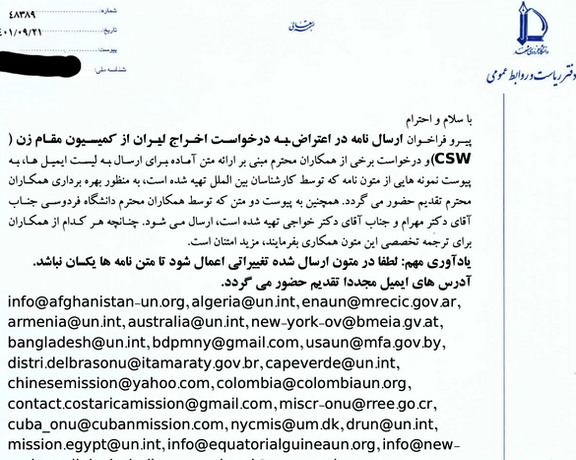
On the eve of a vote to expel the Islamic Republic from the UN women’s commission, leaked documents reveal a behind-the-scenes campaign to stop the move.
According to some documents obtained by Iran International, the Iranian regime is exerting pressure on academic figures to send letters to numerous global bodies to urge them to vote against the move. Among the documents are an official letter from an advisor of the head of Ferdowsi University of Mashhad to her colleagues with the list of emails of UN missions and a list of points to be mentioned in the correspondence by the professors.
The Commission on the Status of Women (CSW) is the principal global intergovernmental body exclusively dedicated to the promotion of gender equality and the empowerment of women. The 54-member UN Economic and Social Council (ECOSOC) will vote on whether to oust the Islamic Republic from the commission on December 14.
In the documents, a list of email addresses of UN missions of many countries as well as rights groups were provided, and university professors were asked to write to them in an attempt to prevent Iran’s expulsion initiated by the United States and supported by others. Samples letters were also given to the academics to use them as templates, but they were asked to change the wordings of the letters a bit so that it would not be obvious that they were part of a state-orchestrated campaign.
The sample letters are a collection of the regime’s propaganda lines blaming foreign powers for the current wave of protests that began in mid-September following the death of 22-year-old Mahsa Amini in custody of hijab police. Such hackneyed lines include blaming other countries for instigating the rallies, blaming the US for using UN mechanisms as political tools, and blaming sanctions by Western countries as the main reason behind the country’s economic woes.
The academics were also asked to mention the claims that women and men enjoy equal rights in the Islamic Republic and that Iranian women have been present in all economic fields and have made great achievements. Such bogus claims were also read out during a UN Human Rights Council meeting late in November held to discuss the deteriorating situation in Iran, especially with respect to women and children.
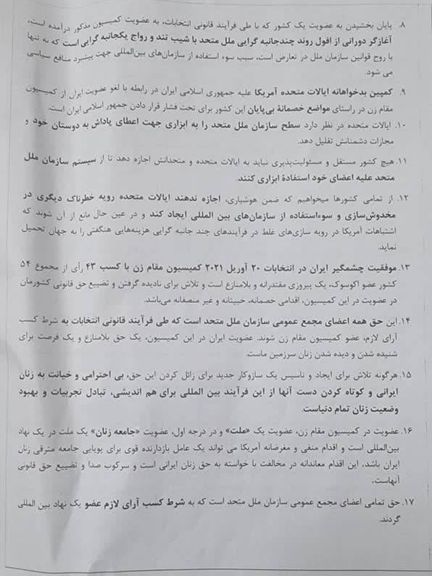
The equality of men and women in Iran is evidently untrue. The Islamic Republic’s constitution clearly states that women are considered as inferior to men in terms of inheritance, testifying in courts and in many other areas according to the Islamic law or sharia. Women in Iran are not allowed to travel abroad without the permission of a male guardian, their share in inheritance is half of what male family members receive -- the financial compensation paid to the victim or heirs of a victim in cases of death, is also half of that of a man.
Among the other points that the academics were asked to mention in their letters to members of the commission is warning them that the expulsion of the Islamic Republic sets a precedent that may be used against other members in the future.
The first step by the United Nations to hold the Islamic Republic accountable for its crackdown on protesters was creating a fact-finding mission by the Human Rights Council and the second move can be the vote to kick the regime off the Commission on the Status of Women. The Geneva-based UN Human Rights Council voted on November 24 to launch an independent investigation into the regime’s deadly repression of protests that has killed around 500 civilians, including about 60 children.
Late in November, the United States circulated a draft resolution on the move, that denounces Iran's policies as "flagrantly contrary to the human rights of women and girls and to the mandate of the Commission on the Status of Women." The US-drafted resolution would "remove with immediate effect the Islamic Republic, which has just started a four-year term on the 45-member commission.
In an interview with MSNBC Sunday US Special Envoy for Iran Robert Malley said, “it makes no sense for Iran to be sitting on a commission whose role is to promote the rights of women when they are doing exactly the opposite.”
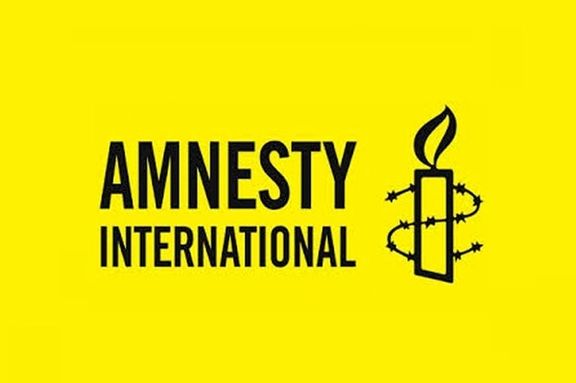
Amnesty International says the Iranian regime is executing individuals to spread fear and take revenge on protesters who stand up against the Islamic Republic.
Responding to the Iranian authorities’ public execution of Majidreza Rahnavard, Diana Eltahawy, Amnesty International’s Deputy Director for the Middle East and North Africa, said Monday “the horrific public execution…exposes Iran’s judiciary for what it is: a tool of repression sending individuals to the gallows to spread fear and exacting revenge on protesters daring to stand up to the status quo.”
The Islamic Republic hanged a second protester, Majidreza Rahnavard in less than a week in public on Monday after charging him with the alleged killing two members of security forces.
Eltahawy further added that the arbitrary execution of the youth “lays bare the extent of the Iranian authorities’ assault on the right to life and their disregard for even maintaining a façade of meaningful judicial proceedings.”
Amnesty urged the international community to take all necessary measures to pressure the Iranian authorities to stop executions and annule death sentences.
The body has identified 20 people at risk of execution in connection with the protests among them 11 sentenced to death.
Three individuals, according to Amnesty, have undergone trials on capital charges and are either at risk of being sentenced to death or may have already been sentenced to death, with no publicly available information on their status.
Six others may be awaiting or undergoing trial on charges carrying the death penalty, stated the international human rights organization.
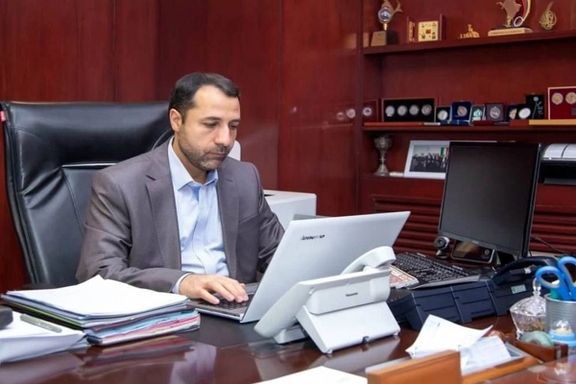
Calls are mounting to remove the chief of Central Bank of Iran (CBI) after the national currency hit another historic low against the US dollar on Tuesday.
Traders in Tehran exchanged 380,000 rials to one US dollar on Tuesday, up from a closing rate of 368,000 last week.
The accelerated fall of the rial has led to reasonable concerns in Tehran business and media circles that soon the dollar will surpass the 400,000 mark in a downward spiral no one can control.
Amid soaring prices, people on social media and websites said Ali Salehabadi, the CBI must be removed while some others believe he is going to resign soon; something he denied later in the day.
A lawmaker on Tuesday addressed the government, saying “President Raisi, Minister of Economy, Governor of the Central Bank, do you know the dollar rate has reached 380,000 rials?”
“What is the current situation you have created for people? They are facing problems in renting houses,” added Ramezanali Sangdavini.
According to a recent report by EcoIran website, food prices have jumped an average of 67.7 percent compared with the same period in the previous year.
Rials drop is directly tied to a 50-percent annual inflation rate. Recently, the CBI reported that housing prices in Tehran increased by 45.9% compared to the same period last year.
The average price of one square meter of housing in Tehran has reportedly reached 467,000,000 rials.

Several members of the German parliament (Bundestag) are politically sponsoring Iranian political prisoners most of whom are in danger of imminent execution on bogus charges.
Ye-One Rhie, a member of the Bundestag who has undertaken political sponsorship of imprisoned dissident rapper Toomaj Salehi said in a series of tweets Monday that she has written this to the Iranian ambassador, the EU special representative for human rights, the council of Europe commissioner for human rights, and the high commissioner for human rights about Toomaj’s case and expressed her great concerns for his well-being.
The 32-year-old rapper who was violently arrested in late October and currently in detention in Dastgerd Prison is awaiting a verdict which many fear could be a death sentence for “corruption on earth”. In her tweets, Rhie underlined that the authorities have deprived Toomaj of any contact with the lawyer he and his family wish to represent him. His lawyer, Amir Raesian, says he has not been allowed access to the case files yet.
The number of German MPs taking political sponsorship of Iranian protesters is growing. Carmen Wegge has declared herself the sponsor of Armita Abbasi, a young woman of 20, who was missing since her arrest on October 10 before being taken to a hospital in Karaj on October 18 by security forces with multiple injuries including internal bleeding and evidence of repeated rape.
Political patronage or sponsorship (politische patenshaften in German) is a way for German parliamentarians to select a specific political prisoner and use their political weight to campaign for the prisoner’s freedom. This is mainly done by addressing the ambassador and the relevant government and international institutions dealing with human rights.
“It is the special responsibility of politicians to make the human rights situation around the world an issue – not just in their own. The violation of human rights must not be accepted anywhere, because all people are free and born with equal rights,” the International Society for Human Rights (ISHR) recently quoted Iran's Nobel Peace Laureate Shirin Ebadi as saying who added that politicians in other countries should actively raise human rights issues in bilateral talks with the Iranian government.
Clara Anne Bünger, founder and board member of Equal Rights Beyond Borders, a Greek-German human rights organization enforcing the rights of refugees and asylum seekers in Greece, Germany, and throughout the EU, has taken on the political sponsorship of the 22-year-old Mohammad Ghobadlou who has been sentenced to death on the charge of “corruption on earth” by the notorious Revolutionary Court judge Abolghasem Salavati.
In a video message circulated on social media two weeks ago, Ghobadlou’s mother called for help for her son before it was too late. She said the court refused to allow his defense lawyer to attend the secret trial. “They sentence him to death in the first session of the court,” she said.
“The EU must ensure that judges like him never find a safe place in the EU,” Bünger said in a tweet.
Salavati and other judges of the Revolutionary Court are famous for harsh sentencing including many death sentences in high-profile trials of political figures and activists, journalists and others over the years and lack of due process in these cases.
Judge Salavati who has recently sentenced Ghobadlou and at least five other protesters to death was sanctioned by the European Union in 2011 and by the US Treasury Department in 2019 for human rights abuses.
Two other Bundestag representatives, Lukas Benner, and Maryam Blumental, have also jointly undertaken to politically sponsor Mahan Sadrat (spelled incorrectly as Sedarat in some sources). The 22-year-old who has been convicted of “waging war against God” in a sham trial and sentenced to death is at imminent risk of execution. Mahan denied being in possession of a knife in court which the prosecutor claims he used to “cause an environment of insecurity and fear” to the people.
Another young man, Mohammad-Mehdi Karami, is being sponsored by Helge Limburg. “The regime in Iran assumes that he was involved in a killing. In truth he should die because he stands up for democracy and human rights. His execution would be a judicial killing,” Limburg tweeted Monday.
Mostafa Nili, a well-known lawyer who has represented many activists, prisoners of conscience and protesters in the past is being sponsored by Norbert Röttgen. Nili was arrested on November 7 by the Revolutionary Guards (IRGC) Intelligence Organization (SAS) along with Hassan Younesi, another human rights lawyer.